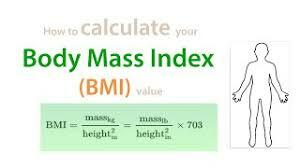Maintaining a healthy weight is key to overall well-being, but how do you know if your weight is in the ideal range for your height? This is where a Body Mass Index calculator comes in handy. A BMI calculator is a simple and reliable tool that helps you determine whether you're underweight, healthy, overweight, or obese based on your height and weight. It’s a quick way to get a snapshot of your overall health and potential risks for related conditions.

What Is Body Mass Index (BMI)?
Body Mass Index (BMI) is a number calculated from your weight and height that gives an estimate of body fat. While it doesn’t directly measure body fat, it provides a general indication of whether you're within a healthy weight range. Health professionals often use BMI as a screening tool to assess whether someone is underweight, overweight, or within a healthy weight range, which can have implications for long-term health.
The formula for BMI is simple:
BMI=Weight(kg)Height2(m2)BMI = \frac{Weight (kg)}{Height^2 (m^2)}
BMI=Height2(m2)Weight(kg)
For those using pounds and inches, the formula is slightly adjusted:
BMI=Weight(lbs)Height2(inches)×703BMI = \frac{Weight (lbs)}{Height^2 (inches)} \times 703
BMI=Height2(inches)Weight(lbs)×703
BMI Categories and What They Mean
Once you calculate your BMI, it falls into one of several categories that help you understand where you stand health-wise:
- Underweight: BMI below 18.5
- Normal (Healthy) Weight: BMI between 18.5 and 24.9
- Overweight: BMI between 25 and 29.9
- Obese: BMI of 30 or higher
Each category helps determine your health risk level. For example, individuals with a higher BMI (in the overweight or obese range) may be at increased risk for conditions like heart disease, type 2 diabetes, and hypertension. Conversely, a BMI that is too low can also signal malnutrition or other underlying health issues.
How to Use a BMI Calculator
A BMI calculator is easy to use and only requires two inputs: your height and weight. Simply enter these values, and the calculator will do the math for you, providing an instant BMI score. You can find BMI calculators online, in fitness apps, or even in some health clinics.
Here’s how to use a BMI calculator step-by-step:
- Enter your weight: You can input this in either pounds or kilograms, depending on the unit system the calculator uses.
- Enter your height: Likewise, you can use either feet and inches or centimeters/meters.
- Calculate: The calculator will quickly process the data and give you a BMI number.
Some advanced calculators also allow you to include your age and gender to refine the results, as BMI interpretations can slightly vary by these factors.
Why Use a BMI Calculator?
1. Quick Health Assessment
A BMI calculator is a fast and effective way to get a sense of your overall health. While it’s not a diagnostic tool, it offers a general indication of whether you’re at a healthy weight. This quick snapshot can be a helpful starting point for evaluating your fitness level or health risks.
2. Monitor Weight Management
Whether you're trying to lose weight, gain weight, or maintain your current weight, tracking your BMI can be helpful. It allows you to monitor changes over time, giving you insight into whether your fitness routine or diet is working.
3. Risk Awareness
Knowing your BMI can help you become more aware of potential health risks associated with being overweight or underweight. If your BMI is outside the healthy range, it may encourage you to make lifestyle adjustments, such as improving your diet, exercising more, or seeking medical advice.
4. Set Realistic Goals
A BMI calculator can help you set realistic weight goals. It provides a range for a healthy weight, helping you understand how much weight you should lose or gain to reach your ideal BMI.
Limitations of the BMI Calculator
While the BMI calculator is a useful tool, it’s important to recognize its limitations. It doesn’t account for factors like muscle mass, bone density, or fat distribution, which can affect your health:
- Athletes: People with a lot of muscle mass may have a higher BMI even though they have little body fat. In such cases, BMI may overestimate body fat.
- Older Adults: As people age, they often lose muscle mass and may have more fat, even if their BMI is within the normal range.
- Children and Teens: BMI calculations for children and teenagers are adjusted based on age and gender because their body composition changes as they grow.
For a more complete picture of your health, it’s a good idea to consider other measurements, such as waist circumference, body fat percentage, and overall fitness levels.
How to Improve Your BMI
If your BMI indicates that you are in the overweight or obese category, don’t worry. There are many ways to improve your BMI and overall health:
- Adopt a Balanced Diet: Eating a balanced diet rich in fruits, vegetables, whole grains, lean proteins, and healthy fats can help you lose or maintain weight.
- Exercise Regularly: Aim for at least 150 minutes of moderate aerobic activity or 75 minutes of vigorous activity each week, combined with strength training exercises.
- Stay Hydrated: Drinking enough water can support metabolism and improve your body’s ability to burn calories.
- Get Enough Sleep: Lack of sleep can affect hormones that regulate hunger, increasing the risk of weight gain.
Conclusion
A Body Mass Index (BMI) calculator is a valuable tool that offers a quick, easy way to assess whether your weight falls within a healthy range. While it doesn’t provide a complete health diagnosis, it serves as a helpful starting point for understanding your body and managing your weight. Combined with other health measurements and professional advice, BMI can be an integral part of your health journey.
Remember, maintaining a healthy BMI is about more than just numbers—it’s about achieving a balanced lifestyle that supports your long-term well-being. If you’re unsure about your results or have concerns, consult with a healthcare professional to get personalized advice on how to improve your health and wellness.




Comments